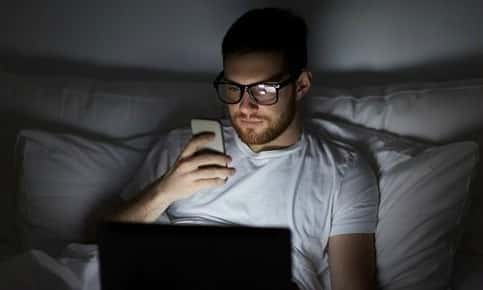
More than one-third of us spend the night tossing and turning, according to the Centers for Disease Control and Prevention. Although the cause of insomnia can't always be determined, exposure to blue light may be a contributing factor.
What is Blue Light?
Every beam of light is made up of a rainbow of colors, including red, yellow, green, violet, indigo, and blue. Blue light, unlike some of the other colors, can be seen by the human eye due to its short wavelength. It's what makes the sky look blue. In addition to blue light from the sun, your eyes are also exposed to the light from smartphones, laptops, desktop computer monitors, TVs, tablets, LED, and fluorescent lights.
How Does Blue Light Affect Me?
Blue light helps you stay alert during the day and improves your mood and memory. Although blue light plays an important role in your life, too much of it can cause eyestrain, headaches, and sleep problems. If you have trouble falling sleeping or staying asleep, blue light may be to blame.
Exposure to blue light affects the production of melatonin, a hormone that regulates the sleep-wake cycle. Changing levels of the hormone help you fall asleep at night and remain alert during the day. Normally, your body increases melatonin production at night, helping you drift off to sleep effortlessly.
If you spend the hours before bedtime working on your laptop, watching TV or playing games on your phone, your melatonin level doesn't increase as much as it should. As a result, falling asleep may take much longer than normal. When your melatonin levels are altered due to blue light exposure, the quality of your sleep may also suffer. You might wake up in the middle of the night or feel tired when you wake up, even though you were in bed for eight hours.
University of Haifa researchers discovered that blue light actually alters your biological clock. Normally, your body temperature drops slightly while you sleep, then rises gradually in the morning, prompting you to wake up. Study participants who were exposed to blue light maintained the same temperature during the night. They also woke up six or more times during the night and reported feeling sleepy in the morning.
What Can I Do to Reduce the Effects of Blue Light?
Limiting blue light exposure during the day, and particularly before bedtime, can help improve your ability to fall asleep, stay asleep and sleep more soundly. Try a few of these tips if you suspect that blue light may be causing your sleep problems:
- Decrease Screen Use Before Bed. Don't watch TV or use laptops, tablets, smartphones, or other digital devices 30 minutes to one hour before you plan to go to sleep.
- Use Special Light Bulbs in Your Bedroom. Replace LED or fluorescent lights with light bulbs that emit much lower levels of blue light. Low blue light bulbs still produce enough light for reading yet don't cause headaches or eyestrain.
- Switch to a Red Night Light. If you use nightlights in your home, consider switching to eye-friendly red night lights.
- Talk to Your Optometrist About Blue-Blocking Lenses. Blue-blocking eyeglass lenses, available in prescription and non-prescription varieties, allow less blue light to reach your eyes. They may be worth a try if you suffer from insomnia, frequent headaches, eye strain, red eyes, or eye pain.
Blue-blocking lenses just may help you enjoy a better night's sleep. Not sure if they're right for you? Schedule an appointment with our optometrist.
Sources:
Centers for Disease Control and Prevention: 1 in 3 Adults Don't Get Enough Sleep
https://www.cdc.gov/media/releases/2016/p0215-enough-sleep.html
Harvard Health Letter: Blue Light Has a Dark Side, 8/13/18
https://www.health.harvard.edu/staying-healthy/blue-light-has-a-dark-side
National Sleep Foundation: How Blue Light Affects Kids & Sleep
https://www.sleepfoundation.org/sleep-topics/how-blue-light-affects-kids-sleep
National Sleep Foundation: Scary Ways Technology Affects Your Sleep
https://www.sleep.org/articles/ways-technology-affects-sleep/
The University of Haifa: The Blue Light Emitted by Screens Damages Our Sleep
